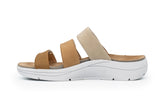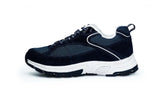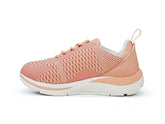Diabetic shoes are specialized footwear designed to protect the feet of people with diabetes from injury and complications. Due to conditions like neuropathy (nerve damage) and poor circulation, which are common with diabetes, a simple blister or cut can escalate into a serious infection, a non-healing ulcer, or even lead to amputation.
Orthopedic shoes are specially designed footwear that provides support, stability, and comfort for individuals with foot ailmens such as flat feet, plantar fasciitis, arthritis, bunions, and diabetic foot complications. Orthoshoes are designed to be comfortable and supportive for people with a variety of foot conditions. Our shoes come with premium orthotic insoles that provide arch support and cushioning. We feature a wide toe box which can help prevent irritation and rubbing. Plus the interior of our shoes is made with soft, cushioning materials that can help eliminate pressure points.
Orthopedic shoes are a broad category of footwear designed to provide superior support, comfort, and corrective function for people with specific foot, ankle, or leg conditions. While all shoes are meant to support your feet, orthopedic shoes are engineered with features that go beyond standard comfort to address and alleviate a wide range of biomechanical issues.
It's a common misconception that orthopedic shoes are only for the elderly or for people with severe foot problems. In reality, they can benefit anyone with chronic foot pain, deformities, or a need for better support due to an active lifestyle or a pre-existing condition.
Key Features of Orthopedic Shoes
What sets orthopedic shoes apart is their construction and design, which focus on foot health and stability. Key features include:
-
Customizable Support: Many orthopedic shoes are built with removable insoles, allowing them to accommodate custom-made orthotics or arch supports. These inserts are tailored to an individual's foot shape and specific needs, providing targeted relief and correction.
-
Wider and Deeper Fit: They often feature a wider and deeper toe box to accommodate foot deformities like bunions and hammertoes without causing painful friction. The extra depth also ensures there is enough room for thick orthotics without making the shoe feel tight.
-
Sturdy Construction: Orthopedic shoes are typically made from high-quality, durable materials. They have a firm heel counter to stabilize the back of the foot and a rigid shank (the part of the sole that runs from the heel to the ball of the foot) to prevent the shoe from bending in the wrong place. This structure helps control motion and reduces strain on the foot and ankle.
-
Cushioned and Shock-Absorbing Soles: The soles are designed to absorb impact from walking and standing. This cushioning protects the joints and soft tissues in the feet, ankles, and knees, which is particularly beneficial for conditions like plantar fasciitis or arthritis.
-
Adjustable Closures: Laces, Velcro straps, or buckles allow for a secure and customized fit that can be adjusted to accommodate swelling throughout the day.
Plantar fasciitis is an inflammation of the plantar fascia, a thick band of tissue that runs across the bottom of your foot, connecting your heel bone to your toes. This condition is a common cause of heel pain, often described as a stabbing pain with your first steps in the morning.
Proper footwear is crucial for managing and recovering from plantar fasciitis. The right shoes can:
-
Reduce strain on the plantar fascia by providing support and cushioning.
-
Absorb shock from walking on hard surfaces, which reduces stress on your heel.
-
Promote proper foot alignment to prevent overpronation (the inward roll of your foot), which can worsen the condition.
-
Relieve pain by evenly distributing pressure across your foot.
-
Redistributing pressure to alleviate pain from high-pressure points.
-
Providing arch support to prevent overpronation (the inward rolling of the foot).
-
Improving gait and overall alignment.
-
Stabilizing foot movement with features like firm heel counters.
When selecting orthopedic shoes, it's best to consult with a podiatrist or a certified pedorthist. They can perform a thorough foot evaluation, recommend the best type of shoe for your condition, and fit you for any necessary orthotics. While you can find many shoes labeled "orthopedic" at retail stores, a professional fitting ensures you get a shoe that truly addresses your specific needs.
Remember, the goal of orthopedic shoes is not just to be comfortable, but to provide the therapeutic and preventative support your feet need to stay healthy and functional.
Orthopedic shoes are designed to provide specialized support and comfort for people with various foot, ankle, and leg conditions. While they are sometimes associated with older adults, many people of different ages can benefit from them.
Here are the groups of people who most commonly need to use orthopedic shoes:
1. Individuals with Chronic Foot Pain or Discomfort: If you experience persistent pain in your feet, especially in your heels or arches, orthopedic shoes can provide significant relief. They are particularly helpful for conditions such as:
-
Plantar Fasciitis: The excellent arch support and cushioning in orthopedic shoes can help reduce the strain on the plantar fascia ligament.
-
Metatarsalgia: Pain in the ball of the foot.
-
Heel Spurs: Bony growths on the heel bone that can be painful.
2. People with Foot Deformities or Abnormalities: Orthopedic shoes are constructed to accommodate and protect feet with structural issues. They are often a necessity for those with:
-
Bunions: The wider and deeper toe box prevents painful pressure on the bony bump at the base of the big toe.
-
Hammertoes: The extra depth and seamless interior prevent rubbing and irritation on bent toes.
-
Flat Feet (Pes Planus): Shoes with built-in arch support help correct the collapsed arch and improve foot alignment.
-
High Arches (Pes Cavus): The cushioning helps to properly distribute weight and absorb shock that might otherwise be concentrated on the heel and ball of the foot.
3. People with Systemic Medical Conditions: Certain health conditions can directly impact foot health, making supportive footwear essential for both comfort and prevention. This includes individuals with:
-
Diabetes: Specialized orthopedic shoes, often called diabetic shoes, are crucial for preventing foot ulcers and other complications from nerve damage (neuropathy) and poor circulation.
-
Arthritis: The cushioning, support, and non-constricting fit can reduce joint pain and swelling caused by conditions like osteoarthritis and rheumatoid arthritis.
-
Gout: During a flare-up, a wide and comfortable shoe is essential to avoid putting pressure on the painful joint, often in the big toe.
4. Individuals Recovering from Injury or Surgery: After a foot or ankle injury or a surgical procedure, orthopedic shoes provide the necessary stability, protection, and support to facilitate proper healing. They can also accommodate swelling and custom orthotics or braces.
5. People with Mobility or Gait Issues: Orthopedic shoes can help improve walking patterns and balance for those with:
-
Overpronation or Supination: The firm heel counter and motion-control features help prevent the foot from rolling too far inward or outward.
-
Chronic Ankle Sprains: The stability provided by the shoe can help prevent repeated injuries.
6. Individuals with Physically Demanding Jobs: If your job requires you to stand or walk for long periods on hard surfaces (e.g., nurses, teachers, factory workers), the superior cushioning and support of orthopedic shoes can prevent foot fatigue and pain.
While many people can benefit from the general comfort and support of shoes with orthopedic features, it is always best to consult with a podiatrist or orthopedic specialist. They can provide a proper diagnosis and recommend the specific type of footwear or custom orthotics that will best address your individual needs.
Diabetic shoes are typically recommended for individuals with diabetes who have:
-
Neuropathy: Nerve damage that causes a loss of sensation in the feet, making it difficult to feel pain from a cut or blister.
-
Poor Circulation: Reduced blood flow to the feet can slow wound healing.
-
Foot Deformities: Conditions like bunions, hammertoes, or Charcot foot can make it difficult to wear standard shoes without causing injury.
-
History of Foot Ulcers or Injuries: People who have previously had foot sores or ulcers are at a higher risk of recurrence.
The primary benefit of diabetic shoes is prevention. By wearing them, individuals can significantly reduce their risk of serious foot complications, including:
-
Preventing Ulcers and Blisters: The seamless, cushioned interior and proper fit protect the skin from friction and pressure that can lead to sores.
-
Improving Circulation: A non-constricting fit and a design that accommodates swelling can help promote better blood flow to the feet.
-
Reducing Pressure Points: The extra depth and supportive inserts redistribute weight and pressure evenly, protecting high-risk areas.
-
Enhancing Stability: The supportive structure can help improve balance and reduce the risk of falls, a major concern for people with neuropathy.






